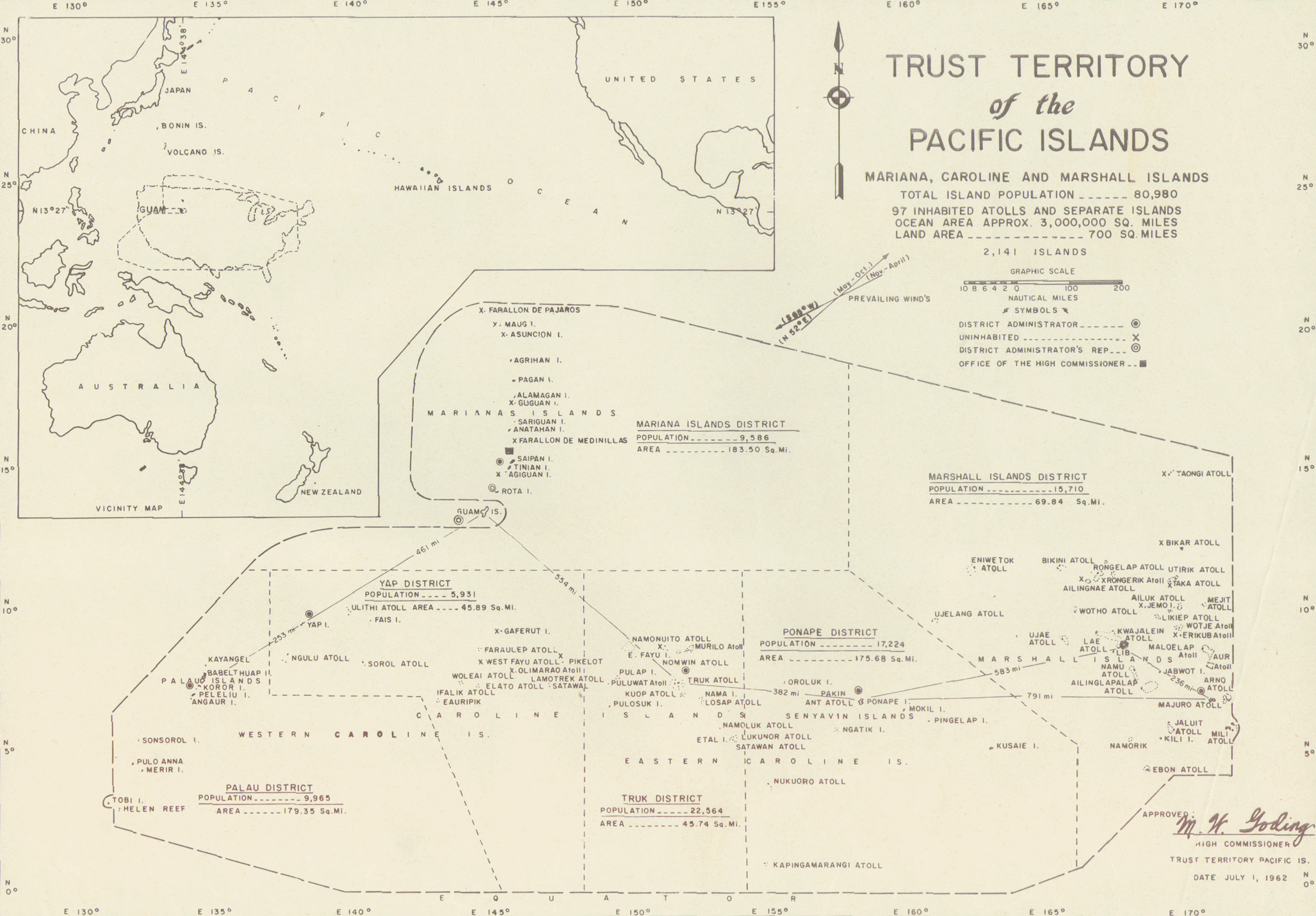|
Trust Territory Of The Pacific Islands
The Trust Territory of the Pacific Islands (TTPI) was a United Nations trust territory in Micronesia administered by the United States from 1947 to 1994. History Spain initially claimed the islands that later composed the territory of the Trust Territory of the Pacific Islands (TTPI).''Encyclopædia Britannica''Trust Territory of the Pacific Islands/ref> Subsequently, Germany established competing claims over the islands. The competing claims were eventually resolved in favor of Germany when Spain, following its loss of several possessions to the United States during the Spanish–American War, ceded its claims over the islands to Germany pursuant to the German–Spanish Treaty (1899). Germany, in turn, continued to retain possession until the islands were captured by Japan during World War I. The League of Nations formally placed the islands in the former South Seas Mandate, a mandate that authorized Japanese administration of the islands. The islands then remained under Jap ... [...More Info...] [...Related Items...] OR: [Wikipedia] [Google] [Baidu] |
United Nations Trust Territory
United Nations trust territories were the successors of the remaining League of Nations mandates and came into being when the League of Nations ceased to exist in 1946. All of the trust territories were administered through the United Nations Trusteeship Council. The concept is distinct from a territory temporarily and directly governed by the United Nations. The one League of Nation mandate not succeeded by a trust territory was South West Africa, at South Africa's insistence. South Africa's apartheid regime refused to commit to preparing the territory for independence and majority rule, as required by the trust territory guidelines, among other objections. South-West Africa eventually gained independence in 1990 as Namibia. All trust territories have either attained self-government or independence. The last was Palau, formerly part of the Trust Territory of the Pacific Islands, which became a member state of the United Nations in December 1994. Trust territories (a ... [...More Info...] [...Related Items...] OR: [Wikipedia] [Google] [Baidu] |
Ronald Reagan
Ronald Wilson Reagan ( ; February 6, 1911June 5, 2004) was an American politician, actor, and union leader who served as the 40th president of the United States from 1981 to 1989. He also served as the 33rd governor of California from 1967 to 1975, after having a career in entertainment. Reagan was born in Tampico, Illinois. He graduated from Eureka College in 1932 and began to work as a sports announcer in Iowa. In 1937, Reagan moved to California, where he found work as a film actor. From 1947 to 1952, Reagan served as the president of the Screen Actors Guild, working to root out alleged communist influence within it. In the 1950s, he moved to a career in television and became a spokesman for General Electric. From 1959 to 1960, he again served as the guild's president. In 1964, his speech " A Time for Choosing" earned him national attention as a new conservative figure. Building a network of supporters, Reagan was elected governor of California in 1966. During his g ... [...More Info...] [...Related Items...] OR: [Wikipedia] [Google] [Baidu] |
Empire Of Japan
The also known as the Japanese Empire or Imperial Japan, was a historical nation-state and great power that existed from the Meiji Restoration in 1868 until the enactment of the post-World War II 1947 constitution and subsequent formation of modern Japan. It encompassed the Japanese archipelago and several colonies, protectorates, mandates, and other territories. Under the slogans of and following the Boshin War and restoration of power to the Emperor from the Shogun, Japan underwent a period of industrialization and militarization, the Meiji Restoration, which is often regarded as the fastest modernisation of any country to date. All of these aspects contributed to Japan's emergence as a great power and the establishment of a colonial empire following the First Sino-Japanese War, the Boxer Rebellion, the Russo-Japanese War, and World War I. Economic and political turmoil in the 1920s, including the Great Depression, led to the rise of militarism, nat ... [...More Info...] [...Related Items...] OR: [Wikipedia] [Google] [Baidu] |
German–Spanish Treaty (1899)
The German–Spanish Treaty of 1899, ( es, link=no, Tratado germano-español de 1899; german: link=no, Deutsch-Spanischer Vertrag 1899) signed by the German Empire and the Kingdom of Spain, involved Spain selling the majority of its Pacific possessions not lost in the Spanish–American War to Germany for 25 million pesetas (equivalent to 17 million Marks). History During the 19th century, the Spanish Empire lost most of its colonies to independence movements. Then came the Spanish–American War in 1898, in which Spain lost most of its remaining colonies. Cuba became independent while the United States took possession of Puerto Rico along with the Philippines and Guam from Spain's Pacific Ocean colonies, the Spanish East Indies. This left Spain with only its African possessions of Spanish Sahara, Ifni, and Spanish Guinea, and with about 6,000 tiny, sparsely populated, and not very productive Pacific islands. These latter were both ungovernable, after the loss of the administra ... [...More Info...] [...Related Items...] OR: [Wikipedia] [Google] [Baidu] |


.jpg)

